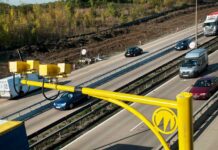
From flood-resistant green spaces to heated bike paths, is a planned smart city in Toronto a smokescreen to extract private data?
By Chris Arsenault
TORONTO – (Thomson Reuters Foundation) – A planned smart city in central Toronto could lead to a six-fold drop in greenhouse gas emissions by pooling residents’ data, said the company behind its development.
From flood-resistant green spaces to heated bike paths, the ideas underpinning Sidewalk Labs’ proposed project represent the “future of sustainable development”, said a spokeswoman for the Alphabet Inc-owned urban technology company.
But critics say the environmental features are a smokescreen for the real goal: extracting as much private data as possible from residents of the Canadian city to boost Sidewalk Labs’ profits.
Supporters and opponents alike agree that the firm’s proposal to build a connected, eco-conscious mini-city on at least 12 acres (4.8 hectares) of prime land could change the way people think about urban development in Toronto and far beyond.
As urban areas suck in 55 percent of the planet’s population – a figure U.N. data says could rise to 68 percent by 2050 – debates on what role tech companies should play in shaping urban life while tackling climate change are becoming increasingly important.
“In downtown Toronto, greenhouse gas emissions per person are about 6.3 tons (annually). We believe we can get that down to just under one ton,” Charlotte Matthews, director of sustainability for Sidewalk Labs, told the Thomson Reuters Foundation.
Alphabet is the parent company of Google.
“We are looking at taking the data that is already out there and putting it to use to improve the comfort and responsiveness of our buildings,” said Matthews.
“It’s a game changer.”
DATA-DRIVEN SUSTAINABILITY
To entice residents to leave their cars at home and pedal through Canada’s frigid winters, the development will have heated bike paths to melt snow, Matthews said.
The bike lanes and the buildings – including 2,500 housing units – will run partially on solar power. Rooftop solar panels will store energy in batteries when it is sunny and then disperse that power back to the buildings at night.
Building from scratch on underused waterfront land in Canada’s largest city, the company will dig out a vast underground system for tree roots under its streets.
That would allow for bigger trees and more green spaces than in a normal city, while also helping manage storm water runoff – a problem expected to intensify with climate change.
To cut down on waste, digital systems will monitor what residents throw away, sending them a message if they put a coffee cup in with their recycling or if they are tossing out too much garbage, Matthews said.
And organic waste will be taken to a special facility where microbes break down the refuse and “fart out methane gas” which can be collected and sold, she said.
Smart cities such as Quayside aim to tackle the issue of spikes in demand for water and power at certain times of the day, said Michael Sutherland, the Toronto-based director of urban solutions for Hatch.
The international consulting firm develops smart cities but has no connection to Sidewalk Labs’ project.
Residents generally shower in the morning and cook in the evening, he said, leading to surges in power and water use that strain infrastructure and the environment.
The project plans to use data and artificial intelligence to analyse consumption patterns so it can “better match supply and demand”, Sutherland said.

Sidewalk Labs says collecting data on everything from who cycles to work to what time people run their dishwashers is essential for creating climate-mitigating systems and technologies.
But David Murakami Wood, a professor at Queen’s University in Ontario who is studying smart cities and surveillance, is wary of the claim.
He noted that many of the sustainability features the company is proposing already exist, so there is no need to gather reams of personal data to make them work.
“They (Sidewalk Labs) are trying to claim credit for a whole lot of ideas that are already out there,” he said.
The proposal amounts to “permanent surveillance” and “massive data scraping” under the guise of fighting climate change, he said.
“They are conducting an experiment in real time, in the real world: the privatization of our cities on a large scale. They will have intellectual property rights over all of this (data).”
PRIVACY VS TECHNOLOGY
The controversy around the project highlights the tension between the demands for personal privacy and the increasing role of data in the pursuit of sustainability.
In a government-funded survey published earlier this year by McMaster University in Ontario, 88 percent of Canadians said they are concerned about their privacy in smart cities, including 23 percent who are “extremely concerned”.
These fears are especially pronounced when data is being collected by private companies, the survey said, with 91 percent of Canadians opposing the sale of their personal information.
“You can’t underestimate the privacy concerns,” said Angela Orasch, a researcher who worked on the survey.
“We live in a system that values property rights,” Orasch told the Thomson Reuters Foundation. “In that system, data is a valuable asset for an individual to have.”
Geoff Cape from Future Cities Canada, a network of partners working on urban issues, said privacy concerns around proposals like Quayside are entirely reasonable, as regulations have not caught up with technology.
“We haven’t created policies to figure out the balance between privacy and the economics of these large platform companies which are driven by data,” Cape said. “It’s a huge gap.”
But, despite the privacy concerns, effective data use is crucial for combatting the environmental challenges cities face and making them better places to live for growing populations, he added.
Sidewalk Labs hopes government officials will agree. A decision on whether the project can go ahead is expected by the end of 2019, a company spokeswoman said. If it is approved, she said construction could take an additional six years.
(Reporting by Chris Arsenault, Editing by Jumana Farouky and Zoe Tabary. Please credit the Thomson Reuters Foundation)






